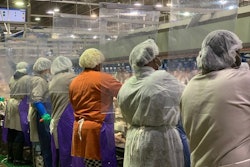
The COVID-19 pandemic has not prevented Sanderson Farms from processing all of its chickens or significantly decreasing processing levels at its facilities.
Speaking during the BMO Capital Markets Global Farm to Market Conference on May 13, Joe F. Sanderson Jr., CEO of Sanderson Farms, said while the pandemic has caused some absenteeism, the situation has not been as severe with his company, which has been “running full,” while other poultry companies have had to idle facilities or cull chickens.
“We are running about 500 absentees a day more than normal. About 100 of those are COVID cases, and the balance of those are people that would be working in close proximity of those COVID cases that we send home for two weeks (with pay) to quarantine, so we don’t expose the rest of the employees to those COVID cases,” Sanderson said, adding that the company has about 17,000 employees.
“We have some days that we might have a department that is not staffed as we would like it to be staffed, but on the whole, we’re doing fine. We’re processing all of our chickens and getting our customers taken care of.”
That doesn’t mean some adjustments haven’t had to be made. Sanderson said even though the company is there have been days in a tray pack plant where they have not had enough people to handle thin-sliced boneless processing, so the company settled “just doing boneless in a tray.” He also said there may be a day in a plant when the company only runs two machines for dark meat deboning, rather than three.
To help offset the absenteeism, the company last week hired about 400 new people, Sanderson added.
How Sanderson Farms has kept COVID-19 cases limited
To date, Sanderson Farms, which according to the WATTAgNet Top Poultry Companies Database operates 12 slaughter plants, 11 hatcheries, nine feed mills and one further processing plant, has had about 270 employees test positive for COVID-19.
Sanderson said he thinks there are a lot of reasons the number of COVID-19 cases has not been higher, but a major reason is the company has been proactive in sending at-risk employees home to quarantine.
As one example, at the company’s poultry plant in Moultrie, Georgia, the company sent 400 workers home who lived in an adjacent county that had been identified as a hot spot, Sanderson said.
“All those people came back. None of them got sick, and Moultrie didn’t have an outbreak. That was a difficult decision to make, but really it was the right thing to do,” Sanderson said.
At Sanderson Farms’ plant in Kinston, North Carolina, a group of 4-5 people who lived in a neighborhood together were sick. The company sent 23 people home with pay until they were tested, and either 16 or 17 of those 23 workers tested positive.
“We got them out of the plant before there was an outbreak at the Kinston plant,” Sanderson said. “When we have people get sick, we pin on a map where those people are, to see if there’s a cluster. That’s how we detected that at Kinston. We moved those people out of the plant.”
Other companies to give presentations at the BMO Capital Markets Global Farm to Market Conference included Tyson Foods and Archer Daniels Midland.
View our continuing coverage of the coronavirus/COVID-19 pandemic.
















